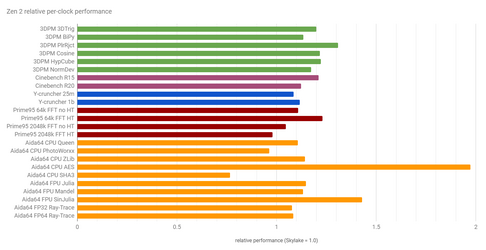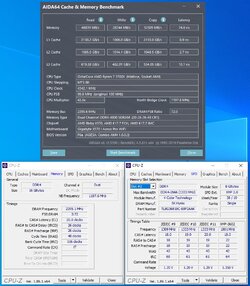- Joined
- Mar 7, 2008

Ok, it's only been 6 weeks since Zen 2 came out, and I only just got around to doing half the testing. Here's the SMT/HT on comparison of Zen 2 (3600) vs a Skylake (6700k) when both are fixed at running 2 cores at 3.0 GHz (configured as 1+1 on the 3600). The idea of limiting the cores and clocks, beyond making them the same, is to limit the influence of other parts of the system such as ram. Although L3 size hopefully doesn't make much difference, it is possible had I used a 9900k and did same, it might perform slightly better in some situations. No HT/SMT scaling results for now.
3DPM I don't have much to say about. I only run this as it gives interesting (higher than anything else) scaling with HT/SMT. At best it is a highly niche compute scenario.
Cinebench needs no introduction. R15 sees more of an advantage than R20.
Y-cruncher calculates digits of Pi and is generally optimised to scale with available hardware, although for now it does not have specific Zen2 consideration so there is some potential for further improvement there. 25m is pretty small, but 1b runs to minutes, and will involve more significant ram access.
Prime95 isn't a just stress test, but is indicative of much software used in the search of prime numbers. Two scenarios were used with the built in benchmark running one task per core. 64k FFT is small and fits well within the CPU's cache. Note in absolute terms, SMT doesn't give more performance than without, but there is less loss on Zen 2 than Skylake. 2048k FFT is large, and Intel gets a slight advantage here when HT is on. I suspect this is related to the memory architecture. The Zen2 L3 cache is nearly sufficient to hold a single task, but not when running two with HT/SMT. Ram bandwidth then starts to impact more, but Zen 2 has half bandwidth writes from each CCD and this is probably starting to choke. Intel CPUs offer full bandwidth each way.
Aida64 has a bunch of synthetic benchmarks. Photoworxx in particular seems to be ram sensitive so that may in part be why it is relatively weak. AES has always been a strong area even with past Zen generations. They seem to have replaced Hash with AES3, and removed VP8. Hash was another one running particularly well on Zen, but AES3 swings towards Intel. VP8 I found to be highly variable between runs so I don't miss that at all.
All considered, Zen 2 has generally better IPC all round compared to SKylake (and by implication, other -lakes until Sunny Cove e.g. Ice Lake). For many things CPU throughput related, assuming it can sale, this would seem the optimal choice until we see a desktop Sunny Cove part from Intel.
Test setup
Common:
Windows 10 64-bit 1903 with August 2019 updates
3DPM v2.1
Aida64 6.00.5100
Prime95 29.8b5
Y-cruncher 0.7.7 9501
AMD system:
Ryzen 3600
Noctua D9L
Asrock B450 gaming-itx/ac, bios 3.50
Kingston HyperX Predator RGB 4000 2x8GB @ XMP3600 settings
Intel system:
i7-6700k
Deepcool Lucifer
Asus Maximus IX Apex, bios 1301
Kingston HyperX Predator RGB 4000 2x8GB @ XMP3600 settings
